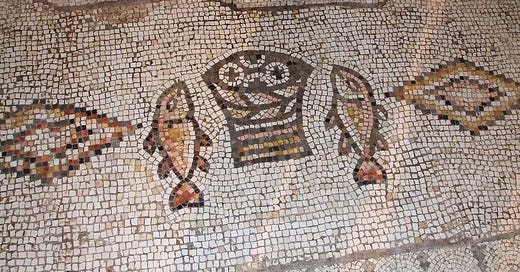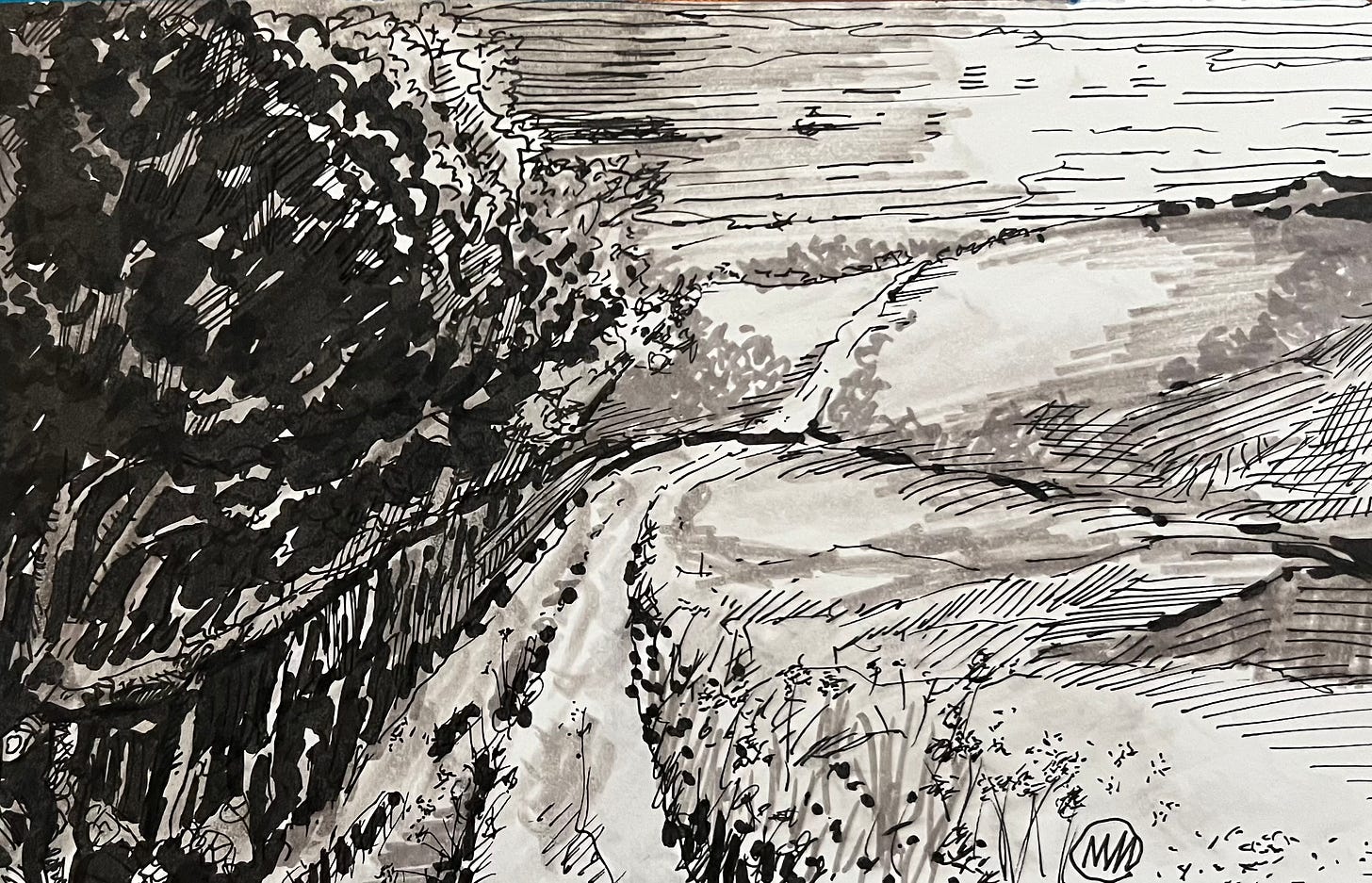
Our Lord Jesus is a master teacher. Jesus is fully God and fully Man. But His role in his earthly ministry was as an itinerant preacher and teacher. And no one in history compares. He is the Master Teacher. In John 6:1-15 we encounter our Lord teaching by doing. And as counselors learn in their education and practice, “The thing is not the thing.” Or, as I prefer, “The presenting issue is the symptom, a signpost, for the real issue.” The real issue is invariably spiritual.
This message is taken from the Sunday Chapel. We invite you to join us for the weekly broadcast at this site.
Moreover, in the Bible, the real issue is universal, as applicable at the moment it was first taught as it is today. The presenting issue of John 6:1-15 is not a lack of food for the people who had gathered to hear Jesus. The presenting issue was a case study in the economics of faith: what to do when there is a big job before you, and you have few resources.
I had the opportunity a few years ago to teach economics in graduate school and enjoyed it (though my primary field is theology). I admire the works of Dr. Thomas Sowell (b. 1930, North Carolina) and the late Friedrich August von Hayek (F. A. Hayek) (1899-1992, Vienna), two giants in the field. I learned basic economic principles from them. However, while some of the principles are the same in this interpretation of John 6:1-15, the context is quite different. This is not about finance. It is about faith.
Discussion Questions follow this message for individuals or groups.
I have been in situations when my resources did not equal the task before me. For more than three decades, I have preached the Gospel. I always needed more resources for that mission than I had innately. I always needed more. For some of you, the gap between need and resources is a daily reality. You don’t have the physical strength to accomplish menial tasks that you would have never thought about a few years ago: Getting out of bed, brushing your teeth, bending over to pat the head of a pup. Little things can be a challenge when the big things are missing. I am sure some of you know exactly what I am talking about. Others encounter the challenge of facing down budgets, human resource issues, difficult family relationships, or paying the bills each month. There is a spiritual value in each of those tasks. Each situation is different yet much is always the same:
“Feed the folks;
But we have nothing;
Go see the lad;
But it is only a little.”
In John 6:1-16 God speaks to each of us concerning the scarcity of physical means in the presence of God’s bountiful supply. The Lord Jesus teaches us that with God, a little is a lot. That is, while our resources to meet the mission may be lacking, God’s supply is vast—even more, He is willing and able.
How so? In the text, we learn at least three truths about God’s economics of faith.
One note as we begin: while the miracle proves the Lord’s divinity, it does not mean He conveyed such prerogatives of divinity to any human. Faith is not replicating the Lord’s rule over creation and the laws of physics. In Christ Jesus, hope has pierced the thin veil between heaven and earth. His presence is the One we long for. Though He has returned to heaven, He is coming again. Until then, He had left us with the spiritual means to traverse our hungry days and face the unthinkable. So, this scripture is about something else. What? Three words summarize the universal truths that come from that day to ours:
The Mandate. This is about the world’s needs and our mandate. “Feed My sheep.” You and I are called to proclaim the Good News of Christ. Yet, only His Spirit can guide us, and only by His Word can a soul be saved, a life be redeemed. The mandate is that we cannot fulfill the commandments of God without our Lord Jesus. It is not just that we cannot face giants or feed five thousand; we cannot pray devoutly, speak with wisdom, or live a quiet life of meaning without Him. The second word that arises from the text is this.
With God, a little is a lot. This doesn’t minimize or dismiss the painful reality of suffering or that some of us struggle to have enough strength to walk to the mailbox. It does mean that Jesus is the One we look to in such times. It does mean that amid a world hungering for truth, we can be confident that Christ is sufficient. — M. A. Milton
The Means. This is about how God chooses unlikely means—ways—demonstrating His power. “You have given us a mandate, Lord. But how?” Then, Andrew says, “There is a boy here who has five barley loaves and two fish, but what are they for so many” (9). What happens next is a lesson in divine economics. A human challenge is to be met with a divine response. “And the response?” you ask. Look to God for the means to meet the mandate, whatever it may be. How did St. Paul put it? “But God hath chosen the foolish things of the world to confound the wise; and God hath chosen the weak things of the world to confound the things which are mighty” (1 Corinthians 1:27). How to pray? The Spirit. How about wisdom? Ask. What about my tangled soul, so twisted by events out of my control that I cannot find the beginning or the end? “Leave it at the cross.” “What? This many people, and just the lad’s lunch?” Take your burdens to the cross, the place of faith in the One who suffered though He was without sin, who was crucified on our behalf, and, yet, who looked down from the cruciform timber that came from an oak that He created to a people He made, who, as the devil imagined, was killing God once and for all. That One rose again. He lives. And He lives to intercede for you. You are not alone. Your soul is not so tangled that the Redeemer cannot use the things that hurt you to become the very things that save you. This is the lesson of the fishes and the loaves. He is the means to unravel the problem. Jesus Christ of Nazareth is Lord, and He is able. And He is willing.
The Miracle is the means of compounding the interests of faith in Christ. This is about the abundance of good that comes with faith in Christ. There is an exponential effect of faith in Christ. Faith never stops producing good as the fishes and loaves never run out. As you look to Christ, the means to realize the mandate before you, you will see an unending supply of divine blessings follow. More fishes and loaves? Not now. But maybe. Not likely. “Then, what?” How about children of an alcoholic discovering the joy of a happy home? I have seen it. A soul lightened from the weight of sin and shame? I have witnessed the tears of joy and the testimonies of murderers, thieves, adulterers, crooked businesspeople, and “hollow men” of all kinds. I am one of them. To turn from any and all to follow the Lord Jesus is to know the goodness of God, beginning to touch everything you come in contact with. Yes. Yes, and Amen.
Conclusion
With God, a little is a lot. This doesn’t minimize or dismiss the painful reality of suffering or that some of us struggle to have enough strength to walk to the mailbox. It does mean that Jesus is the One we look to in such times. It does mean that amid a world hungering for truth, we can be confident that Christ is sufficient. We need Him now more than ever. And His love knows no limits. His grace is inexhaustible. In the name of the Father, the Son, and the Holy Spirit. Amen.
Individual or Small Group Discussion Questions
I trust that these questions will help you apply the powerful message of the Scripture and the Bible to your life in a more personal and meaningful way.
Understanding the Good News: In John 6:1-15, what is our responsibility to share the message of Christ in today's world? Let's discuss how prepared or unprepared we feel to fulfill this duty.
God's Provision: Can you recall a time when you faced a challenge with limited resources, just like the disciples with the loaves and fishes? How did you see God's involvement in that situation? How can this story encourage us to look for God's provision in unexpected ways?
Everyday Miracles: Even though we may not witness the multiplication of loaves and fishes, can you share some examples of divine interventions (“God moments,” as some put it) or unexpected blessings you have experienced or heard about in modern times? How do these events strengthen our faith?
The Value of Everyday Challenges: Can you think of a personal experience where an everyday task (such as bending over when you have a bad back or managing budgets when resources are few) taught you a more profound spiritual lesson or value? How did this change your perspective on such tasks?
Faith in Scarcity: Let's discuss how the phrase "With God, a little is a lot" applies to our lives. In what ways have we experienced God's abundance during times of scarcity, whether in physical resources, emotional strength, or spiritual nourishment?
Christ as Our Ultimate Resource: Considering the message that Jesus is sufficient in all circumstances, how does this truth influence our approach to personal struggles, community challenges, or global issues? Can you share how your relationship with Christ has strengthened and guided you?





